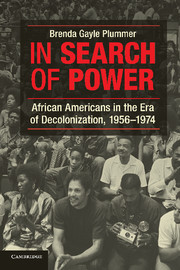Book contents
- Frontmatter
- Contents
- Figures
- Introduction
- 1 A Great Restlessness
- 2 Peace or a Sword?
- 3 “Freedom’s Struggle Crosses Oceans and Mountains”
- 4 Meeting Odinga
- 5 When Race Doesn’t Matter
- 6 Embracing the Globe
- 7 Race, Space, and Displacement
- 8 Africa and Liberation
- 9 Agenda Setting on Two Continents
- Conclusion
- Bibliography
- Index
- References
4 - Meeting Odinga
Published online by Cambridge University Press: 05 December 2012
- Frontmatter
- Contents
- Figures
- Introduction
- 1 A Great Restlessness
- 2 Peace or a Sword?
- 3 “Freedom’s Struggle Crosses Oceans and Mountains”
- 4 Meeting Odinga
- 5 When Race Doesn’t Matter
- 6 Embracing the Globe
- 7 Race, Space, and Displacement
- 8 Africa and Liberation
- 9 Agenda Setting on Two Continents
- Conclusion
- Bibliography
- Index
- References
Summary
Shortly before Christmas in 1963, a group of SNCC volunteers arrived at a downtown Atlanta hotel to meet a foreign visitor. The guest was Oginga Odinga, the Kenyan minister for home affairs and a leading figure in the country’s struggle for national independence. The hotel, the Peachtree Manor, was one of only a few desegregated hostelries in the city. Odinga was much admired for his forthrightness among SNCC workers. He had criticized the United States for its failures on the racial front and had defended Kenya’s decision to seek amicable relations with the Eastern bloc as well as with Western states. Georgia’s only black state legislator arranged Odinga’s State Department–initiated visit.
The SNCC workers entertained Odinga and Joseph Murumbi, minister of state, with freedom songs. After the meeting, accompanied by Odinga, they adjourned to a restaurant near the hotel, where they were refused service. A spontaneous sit-in ensued. Once Odinga left, the Atlanta police swooped in and arrested the group, dragging some physically to jail, where they vowed to remain over the Christmas holiday. SNCC then sent telegrams to President Johnson and Soapy Williams, telling them that Atlanta should be removed from the list of venues for visiting African envoys.
- Type
- Chapter
- Information
- In Search of PowerAfrican Americans in the Era of Decolonization, 1956–1974, pp. 130 - 164Publisher: Cambridge University PressPrint publication year: 2012

